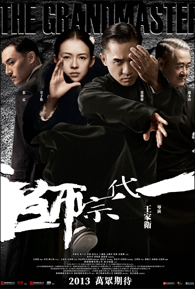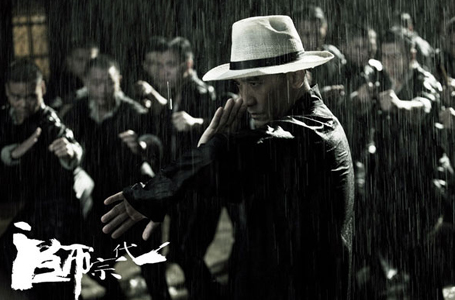
It's no surprise then that over the last five years, all three other films about Ip Man were works of pure fiction, portraying him as an action hero in the Steven Seagal mould. That is to say, an action hero who is so collected and competent, he overpowers all opponents without breaking a sweat and overcomes any challenges with elan that there is essentially no dramatic tension in these films. We don't know what Ip Man did during the second Sino-Japanese war, but it'll be good entertainment to show him patriotically taking on an entire battalion of the Japanese army. We have no clue what Ip Man did before he turned 40, but it's good entertainment to show his early life as the secret history and inspiration behind Bruce Lee's Fist of Fury.
I'd like to think Wong Kar-wai came to the same conclusion as I did about Ip Man in his 12-year-long production of The Grandmaster: that Ip Man as a historical personage left no records of his life or even martial arts career before his arrival in Hong Kong, and that to sensationalise and fictionalise his life and career as a Grandmaster would be to make a very boring, if superficially entertaining film.
Wong's antidote to Ip Man, Ip Man 2, and The Legend is Born: Ip Man is a film that ironically questions Ip Man's grandmaster status. Wong asks: Who were the acknowledged grandmasters of Ip Man's youth in China? What happened to them? Why is Ip Man acknowledged today as a grandmaster?
In grounding his film in these questions, Wong makes a film that is fundamentally sociological in nature as he attempts to recreate the milieu of the really-existing martial arts fraternity in early 20th century China. During the course of the film, we are inducted the rivalries between various schools and masters, and the philosophical and political positioning and position-taking that add or subtract to their cultural capital or 'honour' in the eyes of other masters.
Who is the Grandmaster of the title? Perhaps it is one of the many wizened old men with their numerous disciples and hangers-on. Perhaps it is that proto-feminist heroine that Ziyi Zhang plays, who dedicates to upholding her father's honour of being the last Grandmaster and sacrifices herself in order to exact vengeance when he is betrayed and humiliated by a turncloak. Or perhaps it might be Ip Man, whose modern hagiography wilts on screen when Wong parades old and young masters after another, as if to say that if not for the vagaries of luck and fortune and the caprices of history, he could well be one of those better skilled grandmasters and martial arts experts who faded into history and took their traditions with them.
What is certain though is Ip Man beats a grandmaster retiring at the end of his career in a battle of words and ideas, that his daughter (Ziyi Zhang's character) beats Ip Man in a revenge match that leaves Ip Man pining for the rest of his life for another encounter with her, and that even in the streets of Hong Kong, the grandmaster Ip Man passed by without recognition ageing experts who would have given him a fight in their heyday and young experts who blended into the modernity of Hong Kong.
Wong's film subverts the wuda (武打) martial arts film genre typified by gimmicky martial arts fighting and weapons and old men calling out each others' martial arts moves and tricks and turns it into an elegy to an artform and a community which has faded into the mists of history and obscurity.

